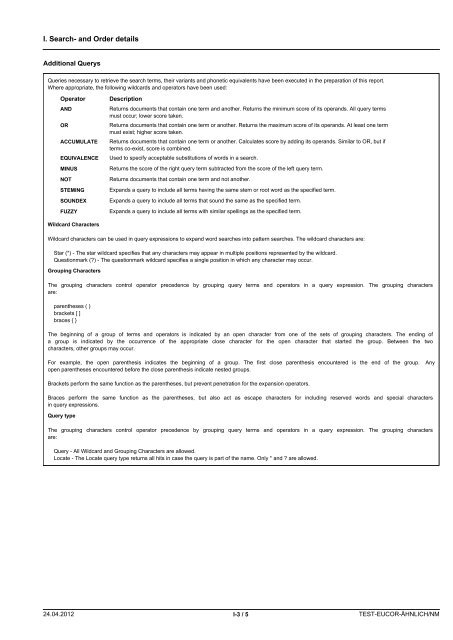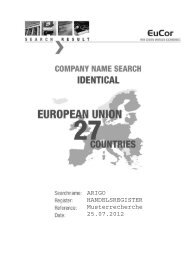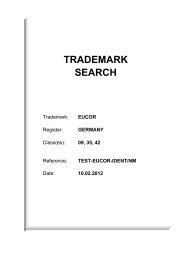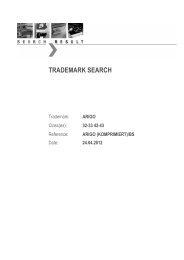- Page 1 and 2: TRADEMARK SEARCH Trademark: EUCOR C
- Page 3 and 4: 24.04.2012 I. Search and Orderdetai
- Page 5: I. Search- and Order details Databa
- Page 9 and 10: 24.04.2012 II. Preselected Hits TES
- Page 11 and 12: II. Preselected Hits Reg.-/App.-no.
- Page 13 and 14: II. Preselected Hits Reg.-/App.-no.
- Page 15 and 16: II. Preselected Hits Reg.-/App.-no.
- Page 17 and 18: 24.04.2012 III. Trademark copie(s)
- Page 19 and 20: III. Trademarkcopie(s) 8736373 Comm
- Page 21 and 22: III. Trademarkcopie(s) 2029631 Germ
- Page 23 and 24: III. Trademarkcopie(s) 302009061354
- Page 25 and 26: III. Trademarkcopie(s) 10219673 Com
- Page 27 and 28: III. Trademarkcopie(s) 709621 Inter
- Page 29 and 30: III. Trademarkcopie(s) 4986733 Comm
- Page 31 and 32: III. Trademarkcopie(s) 4986857 Comm
- Page 33 and 34: III. Trademarkcopie(s) 30575350 Ger
- Page 35 and 36: III. Trademarkcopie(s) 30243152 Ger
- Page 37 and 38: III. Trademarkcopie(s) 302008002509
- Page 39 and 40: III. Trademarkcopie(s) 986196 Inter
- Page 41 and 42: III. Trademarkcopie(s) 950512 Inter
- Page 43 and 44: III. Trademarkcopie(s) 6437537 Comm
- Page 45 and 46: III. Trademarkcopie(s) 8596892 Comm
- Page 47 and 48: III. Trademarkcopie(s) 302009025638
- Page 49 and 50: III. Trademarkcopie(s) 302009025638
- Page 51 and 52: III. Trademarkcopie(s) 302009025638
- Page 53 and 54: III. Trademarkcopie(s) 934117 Commu
- Page 55 and 56: III. Trademarkcopie(s) 3090511 Comm
- Page 57 and 58:
III. Trademarkcopie(s) 3090511 Comm
- Page 59 and 60:
III. Trademarkcopie(s) 30657224 Ger
- Page 61 and 62:
III. Trademarkcopie(s) 501791 Commu
- Page 63 and 64:
III. Trademarkcopie(s) 30336387 Ger
- Page 65 and 66:
III. Trademarkcopie(s) 3607281 Comm
- Page 67 and 68:
III. Trademarkcopie(s) 9640467 Comm
- Page 69 and 70:
III. Trademarkcopie(s) 30741673 Ger
- Page 71 and 72:
III. Trademarkcopie(s) 2222164 Comm
- Page 73 and 74:
III. Trademarkcopie(s) 2222164 Comm
- Page 75 and 76:
III. Trademarkcopie(s) 6535165 Comm
- Page 77 and 78:
III. Trademarkcopie(s) 785959 Inter
- Page 79 and 80:
III. Trademarkcopie(s) 30032646 Ger
- Page 81 and 82:
III. Trademarkcopie(s) 30539927 Ger
- Page 83 and 84:
III. Trademarkcopie(s) 4316246 Comm
- Page 85 and 86:
III. Trademarkcopie(s) 30548601 Ger
- Page 87 and 88:
III. Trademarkcopie(s) 302010046496
- Page 89 and 90:
III. Trademarkcopie(s) 3065984 Comm
- Page 91 and 92:
III. Trademarkcopie(s) 2104672 Germ
- Page 93 and 94:
III. Trademarkcopie(s) 39614421 Ger
- Page 95 and 96:
III. Trademarkcopie(s) 9776411 Comm
- Page 97 and 98:
III. Trademarkcopie(s) 6148373 Comm
- Page 99 and 100:
III. Trademarkcopie(s) 6457386 Comm
- Page 101 and 102:
III. Trademarkcopie(s) 6457386 Comm
- Page 103 and 104:
III. Trademarkcopie(s) 609490 Inter
- Page 105 and 106:
III. Trademarkcopie(s) 39551826 Ger
- Page 107 and 108:
III. Trademarkcopie(s) 601097 Inter
- Page 109 and 110:
III. Trademarkcopie(s) 39713758 Ger
- Page 111 and 112:
III. Trademarkcopie(s) 792859 Inter
- Page 113 and 114:
III. Trademarkcopie(s) 792859 Inter
- Page 115 and 116:
III. Trademarkcopie(s) 39939731 Ger
- Page 117 and 118:
III. Trademarkcopie(s) 6825459 Comm
- Page 119 and 120:
III. Trademarkcopie(s) 923710 Inter
- Page 121 and 122:
III. Trademarkcopie(s) 6566244 Comm
- Page 123 and 124:
III. Trademarkcopie(s) 634408 Inter
- Page 125 and 126:
III. Trademarkcopie(s) 9713314 Comm
- Page 127 and 128:
III. Trademarkcopie(s) 9713314 Comm
- Page 129 and 130:
III. Trademarkcopie(s) 9054453 Comm
- Page 131 and 132:
III. Trademarkcopie(s) 9054453 Comm
- Page 133 and 134:
III. Trademarkcopie(s) 1041298 Inte
- Page 135 and 136:
III. Trademarkcopie(s) 4187308 Comm
- Page 137 and 138:
III. Trademarkcopie(s) 4187308 Comm
- Page 139 and 140:
III. Trademarkcopie(s) 742900 Inter
- Page 141 and 142:
III. Trademarkcopie(s) 30036684 Ger
- Page 143 and 144:
III. Trademarkcopie(s) 1577949 Comm
- Page 145 and 146:
III. Trademarkcopie(s) 3549789 Comm
- Page 147 and 148:
III. Trademarkcopie(s) 6313878 Comm
- Page 149 and 150:
III. Trademarkcopie(s) 593999 Inter
- Page 151 and 152:
III. Trademarkcopie(s) 10017143 Com
- Page 153 and 154:
III. Trademarkcopie(s) 7361934 Comm
- Page 155 and 156:
III. Trademarkcopie(s) 10514966 Com
- Page 157 and 158:
III. Trademarkcopie(s) 9734609 Comm
- Page 159 and 160:
III. Trademarkcopie(s) 8887457 Comm
- Page 161 and 162:
III. Trademarkcopie(s) 1263243 Comm
- Page 163 and 164:
III. Trademarkcopie(s) 850124 Inter
- Page 165 and 166:
III. Trademarkcopie(s) 6789473 Comm
- Page 167 and 168:
III. Trademarkcopie(s) 9017302 Comm
- Page 169 and 170:
III. Trademarkcopie(s) 1243617 Comm
- Page 171 and 172:
III. Trademarkcopie(s) 5310181 Comm
- Page 173 and 174:
III. Trademarkcopie(s) 5310181 Comm
- Page 175 and 176:
III. Trademarkcopie(s) 869193 Inter
- Page 177 and 178:
III. Trademarkcopie(s) 5000633 Comm
- Page 179 and 180:
III. Trademarkcopie(s) 30028954 Ger
- Page 181 and 182:
24.04.2012 IV. Result list TEST-EUC
- Page 183 and 184:
IV. Resultlist 2.1. PHONETIC HIT(S)
- Page 185 and 186:
IV. Resultlist 2.3. SIMILARITY HITS
- Page 187 and 188:
IV. Resultlist 2.3. SIMILARITY HITS
- Page 189 and 190:
IV. Resultlist 2.3. SIMILARITY HITS
- Page 191 and 192:
IV. Resultlist 2.3. SIMILARITY HITS
- Page 193 and 194:
IV. Resultlist 2.3. SIMILARITY HITS
- Page 195 and 196:
IV. Resultlist 2.3. SIMILARITY HITS
- Page 197 and 198:
IV. Resultlist 2.3. SIMILARITY HITS
- Page 199 and 200:
IV. Resultlist 2.3. SIMILARITY HITS
- Page 201 and 202:
IV. Resultlist 2.3. SIMILARITY HITS
- Page 203 and 204:
IV. Resultlist 3. PREFIX HIT(S) Hit
- Page 205 and 206:
IV. Resultlist 3. PREFIX HIT(S) Hit
- Page 207 and 208:
IV. Resultlist 3. PREFIX HIT(S) Hit
- Page 209 and 210:
IV. Resultlist 3. PREFIX HIT(S) Hit
- Page 211 and 212:
IV. Resultlist 3. PREFIX HIT(S) Hit
- Page 213 and 214:
IV. Resultlist 4. SUFFIX HIT(S) Hit
- Page 215 and 216:
IV. Resultlist 4. SUFFIX HIT(S) Hit
- Page 217 and 218:
IV. Resultlist 4. SUFFIX HIT(S) Hit
- Page 219 and 220:
IV. Resultlist 4. SUFFIX HIT(S) Hit
- Page 221 and 222:
IV. Resultlist 4. SUFFIX HIT(S) Hit
- Page 223 and 224:
IV. Resultlist 4. SUFFIX HIT(S) Hit
- Page 225 and 226:
IV. Resultlist 4. SUFFIX HIT(S) Hit
- Page 227 and 228:
IV. Resultlist 4. SUFFIX HIT(S) Hit
- Page 229 and 230:
IV. Resultlist 4. SUFFIX HIT(S) Hit
- Page 231 and 232:
IV. Resultlist 4. SUFFIX HIT(S) Hit
- Page 233 and 234:
IV. Resultlist 4. SUFFIX HIT(S) Hit
- Page 235 and 236:
IV. Resultlist 4. SUFFIX HIT(S) Hit
- Page 237 and 238:
IV. Resultlist 4. SUFFIX HIT(S) Hit
- Page 239 and 240:
IV. Resultlist 4. SUFFIX HIT(S) Hit
- Page 241 and 242:
IV. Resultlist 4. SUFFIX HIT(S) Hit
- Page 243 and 244:
IV. Resultlist 4. SUFFIX HIT(S) Hit
- Page 245 and 246:
IV. Resultlist 4. SUFFIX HIT(S) Hit
- Page 247 and 248:
IV. Resultlist 4. SUFFIX HIT(S) Hit
- Page 249 and 250:
IV. Resultlist 4. SUFFIX HIT(S) Hit
- Page 251 and 252:
IV. Resultlist 4. SUFFIX HIT(S) Hit
- Page 253 and 254:
IV. Resultlist 4. SUFFIX HIT(S) Hit
- Page 255 and 256:
IV. Resultlist 4. SUFFIX HIT(S) Hit
- Page 257 and 258:
IV. Resultlist 4. SUFFIX HIT(S) Hit
- Page 259 and 260:
IV. Resultlist 4. SUFFIX HIT(S) Hit
- Page 261 and 262:
IV. Resultlist 4. SUFFIX HIT(S) Hit
- Page 263 and 264:
IV. Resultlist 4. SUFFIX HIT(S) Hit
- Page 265 and 266:
IV. Resultlist 4. SUFFIX HIT(S) Hit
- Page 267 and 268:
IV. Resultlist 4. SUFFIX HIT(S) Hit
- Page 269 and 270:
IV. Resultlist 5. INFIX HIT(S) Hit
- Page 271 and 272:
IV. Resultlist 5. INFIX HIT(S) Hit
- Page 273 and 274:
IV. Resultlist 5. INFIX HIT(S) Hit
- Page 275 and 276:
IV. Resultlist 5. INFIX HIT(S) Hit
- Page 277 and 278:
IV. Resultlist 5. INFIX HIT(S) Hit
- Page 279 and 280:
IV. Resultlist 5. INFIX HIT(S) Hit
- Page 281 and 282:
IV. Resultlist 5. INFIX HIT(S) Hit
- Page 283 and 284:
IV. Resultlist 5. INFIX HIT(S) Hit
- Page 285 and 286:
IV. Resultlist 5. INFIX HIT(S) Hit
- Page 287 and 288:
IV. Resultlist Statuscodetext Offic
- Page 289:
V. Legal Notice General Conditions









